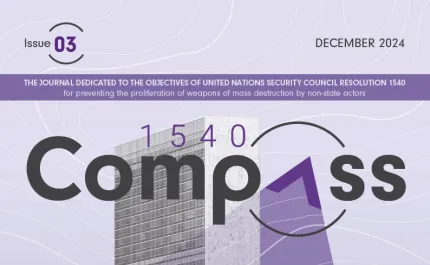
04 Feb 2025
The third edition of 1540 Compass focuses on domestic controls and measures to safeguard sensitive materials, as outlined in operative paragraph 3 (a) and (b) of United Nations Security Council Resolution (UNSCR) 1540 (2004).
UNICRI’s publications offer insights from cutting-edge research, tailored to global and context-specific needs, providing evidence-based analysis to inform policymaking and build advanced capacities.
Addressing topics such as violent extremism, organised crime, cybersecurity, CBRN risk mitigation, artificial intelligence, environmental crimes, gender issues, disinformation, illicit financial flows, and justice reform, these studies foster collaboration and advance sustainable solutions for peace, equality, and development. Explore our collection to stay informed and inspired.
Through our publications, we aim to deepen knowledge, foster collaboration, and drive forward sustainable solutions that promote justice, peace, security, accountability, equality, and development. Whether you are a policymaker, researcher, or practitioner, UNICRI’s publications serve as a trusted resource to inspire informed action and meaningful impact. Explore our collection to stay at the forefront of global and local security challenges.

04 Feb 2025
The third edition of 1540 Compass focuses on domestic controls and measures to safeguard sensitive materials, as outlined in operative paragraph 3 (a) and (b) of United Nations Security Council Resolution (UNSCR) 1540 (2004).

21 Nov 2024
Produced by UNICRI’s Centre for Artificial Intelligence (AI) and Robotics and with the financial support of the European Union (EU), the report explores global public perceptions of AI in law enforcement. It is based on a survey conducted with 670 respondents across six continents over a period of eight months.

31 Oct 2024
The latest issue of Freedom from Fear confronts some of the most pressing global challenges: the interconnected crises of conflict, environmental degradation, and the pervasive influence of organised crime and violent extremism. In a world marked by ongoing injustice and widening inequalities, this edition explores the cycles of violence that impact both human societies and the planet, underscoring the urgent need for global cooperation and reform.

17 Oct 2024

04 Feb 2025
The third edition of 1540 Compass focuses on domestic controls and measures to safeguard sensitive materials, as outlined in operative paragraph 3 (a) and (b) of United Nations Security Council Resolution (UNSCR) 1540 (2004).

21 Nov 2024
Produced by UNICRI’s Centre for Artificial Intelligence (AI) and Robotics and with the financial support of the European Union (EU), the report explores global public perceptions of AI in law enforcement. It is based on a survey conducted with 670 respondents across six continents over a period of eight months.

31 Oct 2024
The latest issue of Freedom from Fear confronts some of the most pressing global challenges: the interconnected crises of conflict, environmental degradation, and the pervasive influence of organised crime and violent extremism. In a world marked by ongoing injustice and widening inequalities, this edition explores the cycles of violence that impact both human societies and the planet, underscoring the urgent need for global cooperation and reform.

17 Oct 2024

04 Feb 2025
The third edition of 1540 Compass focuses on domestic controls and measures to safeguard sensitive materials, as outlined in operative paragraph 3 (a) and (b) of United Nations Security Council Resolution (UNSCR) 1540 (2004).

21 Nov 2024
Produced by UNICRI’s Centre for Artificial Intelligence (AI) and Robotics and with the financial support of the European Union (EU), the report explores global public perceptions of AI in law enforcement. It is based on a survey conducted with 670 respondents across six continents over a period of eight months.

31 Oct 2024
The latest issue of Freedom from Fear confronts some of the most pressing global challenges: the interconnected crises of conflict, environmental degradation, and the pervasive influence of organised crime and violent extremism. In a world marked by ongoing injustice and widening inequalities, this edition explores the cycles of violence that impact both human societies and the planet, underscoring the urgent need for global cooperation and reform.

17 Oct 2024

04 Feb 2025
The third edition of 1540 Compass focuses on domestic controls and measures to safeguard sensitive materials, as outlined in operative paragraph 3 (a) and (b) of United Nations Security Council Resolution (UNSCR) 1540 (2004).

21 Nov 2024
Produced by UNICRI’s Centre for Artificial Intelligence (AI) and Robotics and with the financial support of the European Union (EU), the report explores global public perceptions of AI in law enforcement. It is based on a survey conducted with 670 respondents across six continents over a period of eight months.

31 Oct 2024
The latest issue of Freedom from Fear confronts some of the most pressing global challenges: the interconnected crises of conflict, environmental degradation, and the pervasive influence of organised crime and violent extremism. In a world marked by ongoing injustice and widening inequalities, this edition explores the cycles of violence that impact both human societies and the planet, underscoring the urgent need for global cooperation and reform.

17 Oct 2024